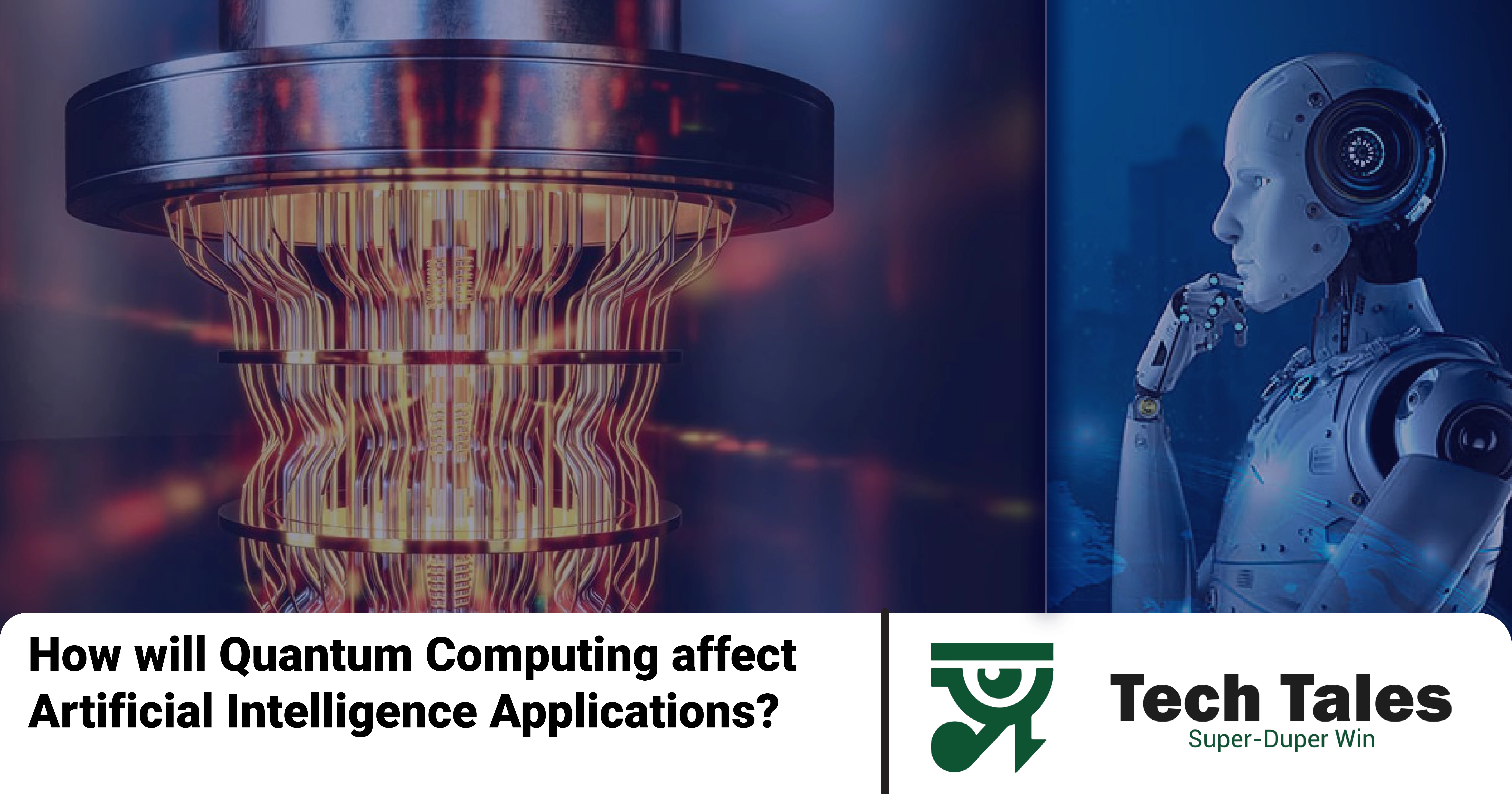Artificial intelligence is anticipated to be significantly impacted by quantum computing. It has been demonstrated that quantum computers will process data far more quickly than conventional classical computers, resulting in the development of more potent and accurate AI algorithms.
Introduction to How will Quantum Computing affect Artificial Intelligence Applications
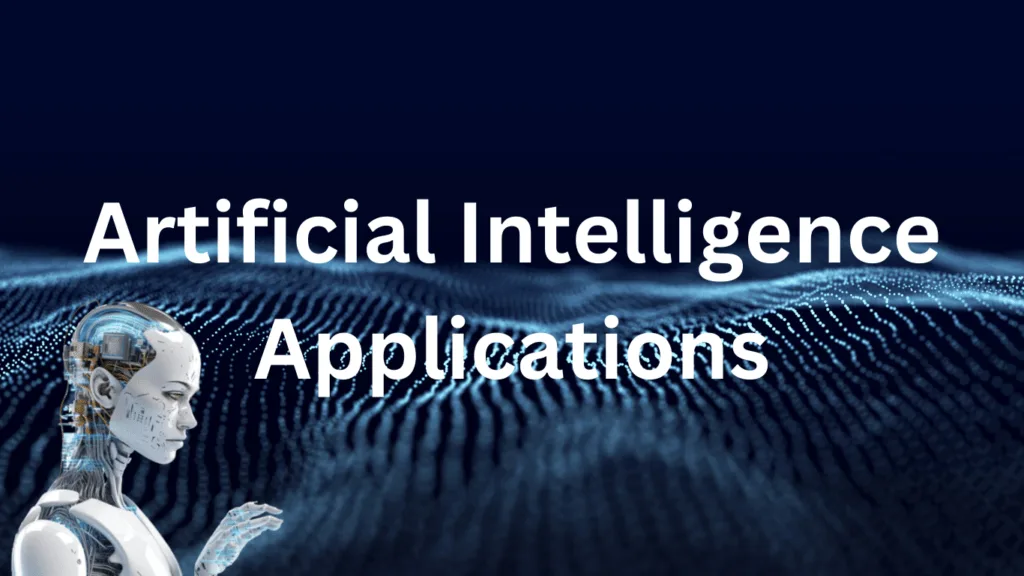
Gushu Li, a professor at the University of Pennsylvania School of Engineering and Applied Science. He describes quantum AI as a growing field in computer science that is devoted to investigating the possible overlaps between AI and quantum computing in an email interview. It was, “It seeks to apply principles from quantum mechanics to enhance AI algorithms.” More and more scientists are beginning to predict that AI models created with quantum computing will surpass AI models created with classical computing in the near future. (Note for More)
Related Post
Overview of Quantum Computing
Similar to classical computers, quantum computers operate by using qubits rather than bits. These qubits are unique systems that function similarly to superconducting electric circuits, subatomic particles composed of atoms, or other systems that store data in a set of amplitudes applied to both 0 and 1, as opposed to just two states (0 or 1). We refer to this intricate idea in quantum mechanics as a superposition. Those amplitudes can apply to multiple qubits at once through a process known as quantum entanglement.
Overview of Artificial Intelligence
The simulation of human intelligence processes by machines, particularly computer systems, is known as artificial intelligence. Expert systems, natural language processing (NLP), speech recognition, and machine vision are a few applications of artificial intelligence.
Vendors are scurrying to highlight how AI is incorporated into their products and services as the hype surrounding AI has intensified. What they call “AI” is often a well-known technology, like machine learning.
Machine learning algorithms in AI require specific hardware and software in order to be written and trained. Although there isn’t just one programming language used for AI, Python, R, Java, C++, and Julia are all widely used by AI developers.
Intersection of Quantum Computing and AI; How Quantum Computing affect Artificial Intelligence Applications
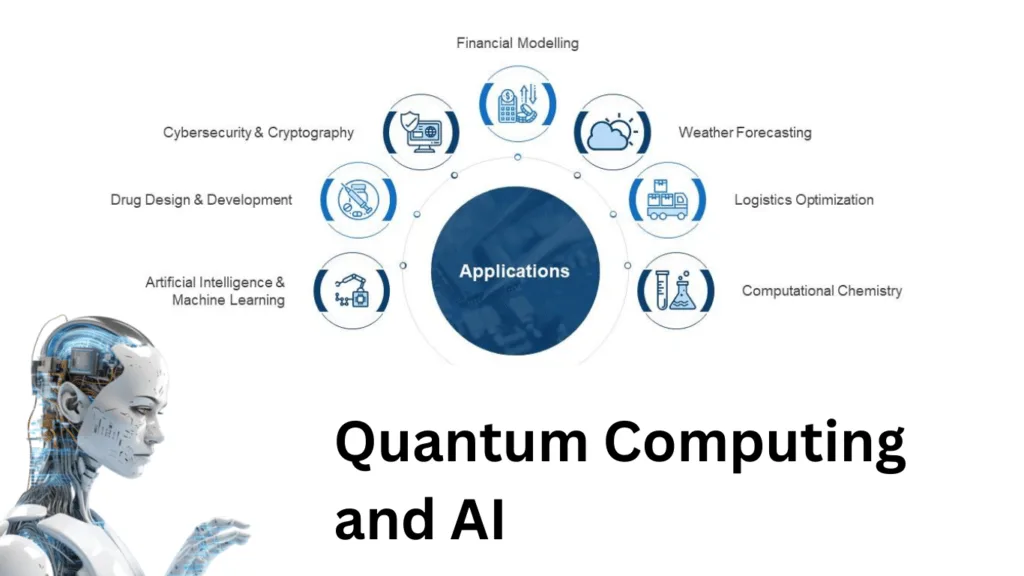
The combination of quantum computing with artificial intelligence (AI) has the potentiality, to significantly increase AI capabilities, revolutionizing all kinds of IoT and technology industries and scientific activities.
Here are some ways that quantum computing and AI can work together:
Quantum Machine Learning
This field combines quantum mechanics, high-level algorithm and machine learning to solve complex problems and improve data analysis, quality data information, optimization, and decision-making.
Faster processing
Quantum computers can perform computations at speeds that are much faster than current classical computers. This can help AI systems run faster and make more accurate predictions and give more accurate information.
Simultaneous processing
Quantum computers can process multiple options at the same time, which can help AI systems explore solutions more accurate and more quickly. Read out this article on Quantum Computer can apply 0 & 1 at the same time.
Improved optimization
Quantum computing can help AI systems find the best solutions to optimization problems, which are common in many AI applications.
Applications
Quantum computing and AI can be used in a variety of fields, including the language processing system, image recognition, logistics, transportation, and etc.
There are also some challenges to consider, such as:
- Ethical considerations: Quantum computing could break current encryption & description methods, which could make sensitive information vulnerable and in at risk.
- Nascent stage of development: Quantum computing is still in the early stages of development as for regular uses.
Fundamental Concepts of Quantum Computing for AI
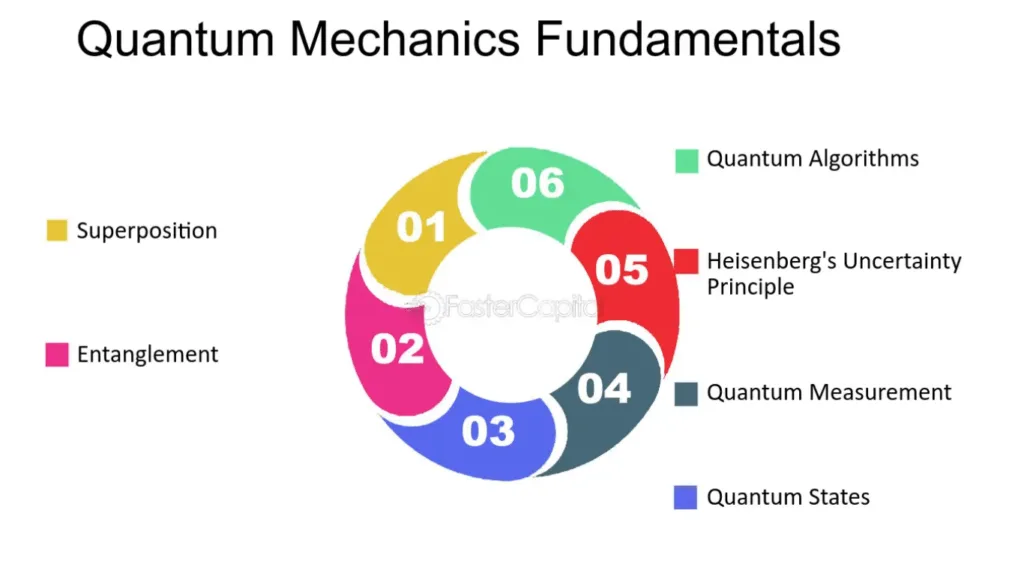
The three fundamental principles of quantum computing—superposition, qubits, and entanglement—form the foundation for understanding quantum algorithms:
- Superposition refers to a particle’s ability to exist in multiple states simultaneously. For instance, an electron can have a right or left spin, which remains indeterminate until measured, at which point it collapses into one state. Unlike a classical bit that can be either zero or one, a qubit can represent a multitude of states. The value of a qubit is only determined upon measurement, resolving to either |1> or |0>.
- Entanglement is another unique characteristic of quantum systems. If two particles are entangled, measuring the spin of one instantly determines the spin of the other, regardless of the distance between them.
Quantum computing leverages both superposition and entanglement, offering the potential to solve specific problems significantly faster than classical computers, particularly in areas like complex simulations, optimization, cryptography, and large database searches.
Quantum Bits (Qubits)
A qubit, also known as a quantum bit, is the fundamental unit of quantum information in quantum computing. It is the quantum equivalent of the traditional binary bit, physically achieved using a two-state device. One of the most basic quantum systems that demonstrates the peculiarities of quantum mechanics is a qubit, which is a two-state quantum mechanical system.
Quantum Algorithms
Within the realm of quantum computing, a quantum algorithm is defined as an algorithm that operates on a practical model of quantum computation. The most widely utilized model in this regard is the quantum circuit model.
Quantum Supremacy
In quantum computing, quantum supremacy or quantum advantage is the goal of demo
Related Post
How Quantum Computing Affects Artificial Intelligence
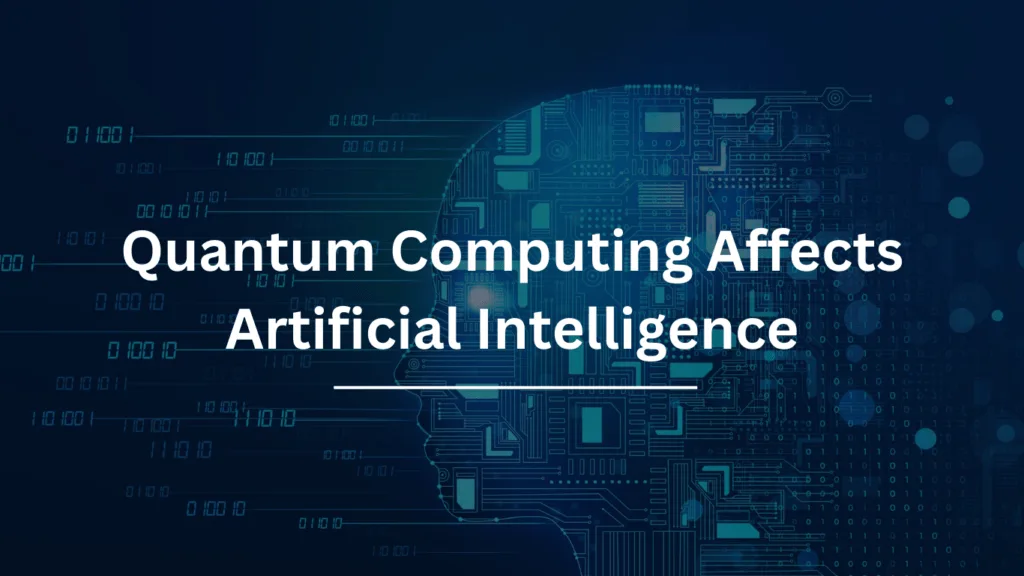
Quantum computing has a significant impact on artificial intelligence (AI) by making AI systems faster, more precise, and more effective. Quantum computers can outperform traditional computers in many AI applications because they can perform multiple calculations simultaneously and process large amounts of data more efficiently.
Enhanced Problem-Solving Capabilities
The ability of all forms of artificial intelligence and non-artificial intelligence works to solve problems can be improved by quantum computing. They can be used, for instance, to test nuclear reactors and to create new kinds of artificial intelligence models and toolkits. They can find many routes to locate the greatest potential approach because they are able to work with both 0 and 1 at the same time.
Quantum Speedups in AI Training
Using the concepts of superposition and entanglement, quantum computers may do several calculations at once. AI algorithms may accelerate significantly as a result of this parallelism, particularly when processing huge datasets or resolving challenging optimization issues.
Improved AI Algorithm Efficiency
AI algorithms can be significantly improved in the age of quantum computing. For this, we must communicate with artificial intelligence and attempt to develop their technologies in the area of quantum computing, as well as transition from classical computing to quantum computing, so that both quantum computers and AI can improve even further.
Real-World Applications of Quantum Computing in AI
Quantum computing has several real-world applications in artificial intelligence section. Will talk more about this with in details, as well as the overall matters.
Current Quantum AI Applications
- Artificial intelligence
- Better batteries
- Cleaner fertilization
- Cybersecurity
- Drug development
- Electronic materials discovery
- Financial modeling
- Solar capture
- Traffic optimization
- Weather forecasting and climate chang
The Top Quantum Computing Applications to Know are listed above.
Quantum Computing in AI-Powered Platforms
AI-powered platforms like Brainly and Quora (User Generated Content – UGC platform) leverage AI to provide answers, facilitate learning, and to connect people.
Brainly focuses on educational support, helping students with homework questions, while Quora is a question-and-answer platform where users share knowledge and insights on various topics to know others, also to know more.
Enhancing AI Capabilities with Quantum Computing
The integration of quantum computing into AI can significantly improve the performance of all kinds of technology platforms. For instance, quantum algorithms can process large datasets much way faster than classical algorithms.
This speed can help AI systems analyze user queries and responses more efficiently, leading to quicker and more accurate answers.
Moreover, quantum computing can enhance machine learning, a key component & logic of AI.
Machine learning models require extensive data to learn patterns and make accurate predictions. Quantum computers can handle complex calculations and data structures much faster, enabling these models to train on larger datasets more effectively and more efficiently. As a result, platforms like Brainly and Quora could offer more personalized and relevant content to their users.
Potential Applications in Educational and Social Platforms
In educational platforms like Brainly, quantum computing could optimize the way questions are matched with answers. By understanding the context better, AI could provide more accurate explanations tailored to each student’s level of understanding. This personalized approach can improve learning outcomes for every grade students.
On social platforms like Quora, quantum-enhanced AI could analyze vast amounts of user-generated content. This analysis could identify trends and topics of interest more quickly, helping the platform to be more relevant information for its users. It could also enhance the moderation of content, ensuring that high-quality answers are highlighted and harmful content is filtered out more effectively.
Challenges and Future Directions
Despite the potential benefits, there are challenges to integrating quantum computing with AI. Quantum technology is still in its early stages, and developing practical applications will take time. Additionally, there’s a need for skilled professionals who can bridge the gap between quantum computing and AI.
Looking ahead, as quantum computing technology matures, it could revolutionize how AI-powered platforms operate. We may see faster, smarter, and more responsive systems that improve user experiences in education and knowledge sharing. The combination of these technologies holds great promise for the future, making information access and learning more efficient and effective.
Future Prospects of Quantum AI in Various Industries
The future of quantum AI is promising to revolutionize industries and address global challenges. Some of the potential benefits include:
- Hybrid AI Combining classical AI and quantum AI to take advantage of both strengths and compensate for weaknesses.
- Quantum network expansion Connecting quantum computers and devices through quantum channels, such as photons, satellites, or optical fibers.
- Improved AI capabilities Quantum computing can remove limitations on data size, complexity, and problem solving speed.
- And etc… to know more you can visit here.
Related Post
Quantum Machine Learning
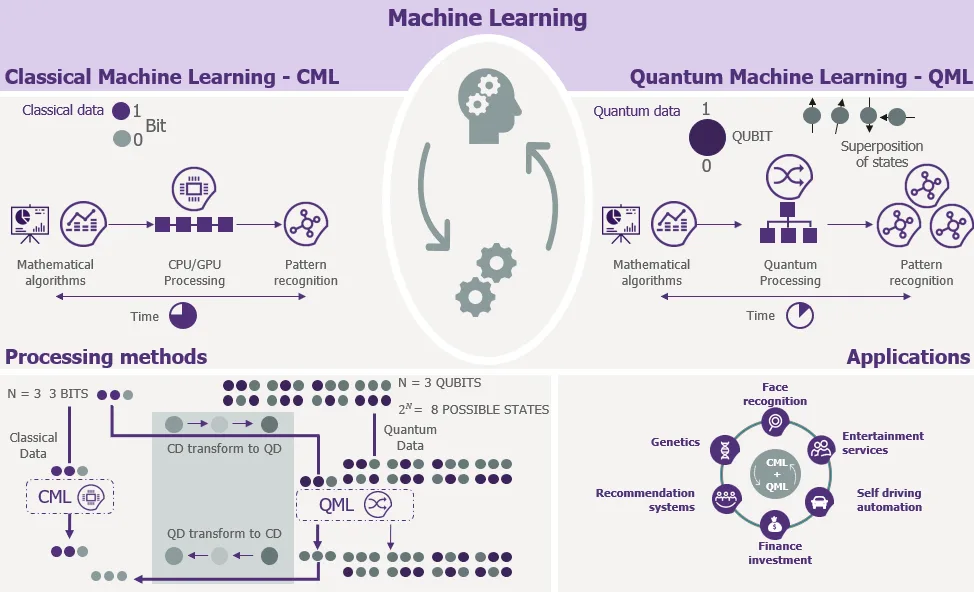
Quantum machine learning is a research & study area that explores the ideas from quantum computing and machine learning in a single study. For example, we might want to find out whether quantum computers can speed up the time it takes to evaluate a machine learning model.
Definition and Key Concepts
Quantum computing is a type of calculation that leverages the principles of amount mechanics to achieve computations, exercising amount crumbs( qubits) which can live in multitudinous countries contemporaneously( superposition) and can be tangled with other qubits, allowing for significantly faster processing of daedal cases assimilated to traditional computers; while engine literacy is a field of computer wisdom where algorithms get from data to make prognostications or opinions without unequivocal programming, frequently utilizing ways like neural networks to identify patterns in voluminous datasets.
Quantum Neural Networks
Quantum neural networks can be applied to algorithmic project given away qubits with tunable collective relations, one can essay to get relations following the prescriptive backpropagation rule from a training set of asked input- affair dealings, taken to be the asked affair algorithm’s geste.
Quantum Kernel Methods and Support Vector Machines
The general task of engine literacy is to detect and study patterns in data. For numerous datasets, the datapoints are more understood in a advanced dimensional point room. This is the abecedarian principle behind a series of engine literacy algorithms known as kernel styles.
Quantum Optimization and Artificial Intelligence
Quantum computing can optimize complex functions more effectively and more efficiently; it improves AI model training. This is especially helpful for tasks, such as training neural networks, where quantum computers may be able to determine main weights far more quickly than traditional techniques of classical computers.
Optimization in AI: Classical vs. Quantum Approaches
Traditional AI is based on classical computers, which use Bits/Qubits to represent information as 0 or 1. Quantum AI, on the other hand, is based on quantum computers that use qubits. Optimization in AI refers to the process of finding the best solution among a multitude of possibilities. In the realm of artificial intelligence, optimization plays a crucial role in various tasks such as machine learning, computer vision, and natural language processing. There are two primary approaches to achieve optimization in AI: classical and quantum.
Classical approaches rely on algorithms and heuristics, which are computationally efficient but often struggle with complex problems. Quantum approaches, on the other hand, leverage the principles of quantum mechanics to explore a vast solution space exponentially faster than classical methods. Quantum computers can potentially solve optimization problems that are currently intractable for classical computers, offering a new frontier in AI optimization.
Solving Complex AI Problems with Quantum Computing
Quantum computing has the potential to improve AI capabilities by removing limitations such as data size, complexity, and problem solving speed.” Researchers are already working to improve current AI methods in research by applying quantum computing techniques to protein structure prediction.
Implications for AI-Powered Businesses
AI technology promises enormous benefits to businesses, such as greater customer engagement, data analysis, process automation, strategic recommendations, and decision making.
Challenges of Quantum Computing in AI Development
Decoherence is a difficulty in quantum computing because calculations must be finished prior to decoherence to avoid errors. While improving a qubit’s coherence time is an important field of research, one preferred technique is to use error-correcting codes.
Technical Barriers in Quantum AI Integration
Current quantum hardware is insufficiently durable or scalable for widespread integration with AI systems, which demand stable and dependable computing environments. The lack of mature, error-corrected quantum computers with hundreds of qubits poses a considerable challenge.
Ethical and Security Implications
The term “ethical implications” refers to the potential ethical considerations and consequences of research or professional activity, such as questions of impartiality, bias, and ethical practices like copyright and plagiarism. AI-generated definition based on: Ways of Experiencing Information Literacy (2012).
Talent and Infrastructure Requirements
Quantum computing necessitates a thorough understanding of science and math, as you will be working with numbers and calculations virtually every day. Quantum computing jobs normally require a bachelor’s degree in one of the following areas: mathematics or physics.
Quantum Cryptography and AI Security
Before we go into the function of AI in quantum cryptography, let us first understand the fundamentals of quantum cryptography. Unlike conventional encryption, which secures data using mathematical methods and computational complexity, quantum cryptography uses quantum physics principles to assure the highest level of security.
Enhancing AI Security with Quantum Cryptography
AI approaches can improve quantum crucial distribution protocols, resulting in safe communication in quantum networks. While this topic is still in its early phases, it has the potential to lead to significant advances in secure communication in the near future.
Threats to AI Systems from Quantum Computing
The combination of quantum computing with artificial intelligence (AI) promises a boost in computational speed, but it will also introduce new threats to cybersecurity, privacy, and other possible harms, S&P Global stated Tuesday.
Future Trends and Predictions for Quantum AI
Quantum AI has the potential to solve challenging issues that traditional computers cannot currently address. Ethical AI and Governance: As the use of AI grows, ethical considerations and governance will become increasingly important. Ensuring openness, fairness, and accountability in AI systems will be critical.
Quantum Computing Roadmap for AI
The intersection of quantum computing and artificial intelligence (AI) promises groundbreaking advancements. Here’s a potential roadmap for this exciting field:
Near Term (2023-2028)
- Quantum Hardware Development:
- Scalability: Increase the number of qubits in quantum processors to handle more complex problems.
- Error Correction: Improve error-correction techniques to mitigate the effects of noise in quantum systems.
- Quantum-Classical Hybrid Architectures: Develop systems that combine the strengths of classical and quantum computing for specific tasks.
- Quantum Algorithms for AI:
- Machine Learning: Explore quantum algorithms for tasks like optimization, classification, and pattern recognition.
- Neural Networks: Develop quantum neural networks with potential advantages over classical counterparts.
- Natural Language Processing: Investigate quantum approaches to tasks like text classification, translation, and generation.
- Quantum Software and Tools:
- Quantum Programming Languages: Create user-friendly languages for quantum computing.
- Development Environments: Develop integrated development environments (IDEs) tailored for quantum programming.
- Quantum Libraries and Frameworks: Build libraries and frameworks for common quantum algorithms and tasks.
Mid Term (2029-2035)
- Quantum AI Applications:
- Drug Discovery: Accelerate drug discovery by simulating molecular interactions.
- Materials Science: Design new materials with desired properties.
- Optimization Problems: Solve complex optimization problems more efficiently.
- Financial Modeling: Improve risk assessment and portfolio optimization.
- Quantum Machine Learning:
- Quantum Generative Models: Explore quantum generative models for generating realistic data.
- Quantum Reinforcement Learning: Develop quantum algorithms for reinforcement learning tasks.
- Quantum Federated Learning: Explore quantum approaches to privacy-preserving machine learning.
- Quantum-Classical Hybrid Systems:
- Co-design: Develop hybrid systems where classical and quantum components are tightly integrated.
- Workflow Optimization: Optimize workflows for maximum efficiency, combining the strengths of both types of computing.
Long Term (2036+)
- Quantum Supremacy for AI:
- Demonstrate Quantum Advantage: Achieve a quantum speedup for AI-related tasks that is significantly beyond the capabilities of classical computers.
- Real-World Applications: Develop practical applications that leverage quantum supremacy.
- Quantum AI Ecosystem:
- Standardization: Establish standards for quantum hardware, software, and algorithms.
- Education and Training: Develop educational programs and training materials to foster a quantum-skilled workforce.
- Collaboration: Foster collaboration between academia, industry, and government to accelerate progress.
This roadmap outlines a potential path for the development of quantum computing for AI. However, the actual timeline and specific milestones may vary depending on technological advancements and research breakthroughs.
Emerging Quantum AI Technologies
Quantum-enhanced AI can greatly expedite machine learning operations, increasing their power and efficiency and paving the path for a brighter future. Tech leaders and experts spoke with FutureCIO about quantum-enhanced AI’s promise, limitations, and impact on AI technologies.
Predictions for Quantum AI by 2030
The global quantum AI market was valued at USD 256.0 million in 2023 and is expected to increase at a 34.4% CAGR from 2024 to 2030. The market is quickly expanding, spurred by advances in quantum computing and its ability to address issues that traditional computers struggle with.
Conclusion: The Quantum AI Revolution
Industries understand that quantum AI can deliver the right data more quickly, even with the additional risks and expenses. Zapata, a provider of quantum software, has rebranded itself as ZapataAI. According to Google spinout SandboxAQ, it makes use of both quantum and artificial intelligence. Major quantum industry conferences are also featuring panels and speeches on quantum artificial intelligence, such the Inside Quantum Technology events.
Results are already being produced by the natural fit between quantum computing and AI, and I think more will follow. We are about to witness an applications revolution, in which artificial intelligence will supply the brains and quantum computers the muscles.
Key Takeaways
Quantum AI: Quantum AI is a field combining quantum computing principles with AI to enhance the speed, accuracy, and problem-solving capabilities of AI systems. It is predicted that quantum AI models will eventually surpass those created using classical computing.
Quantum Computing Overview: Quantum computing leverages quantum mechanics principles like superposition and entanglement, offering faster solutions to complex problems compared to classical computers.
AI Overview: AI involves simulating human intelligence processes such as natural language processing, image recognition, and decision-making through machine learning algorithms.
Intersection of Quantum Computing and AI:
- Quantum Machine Learning: This combines quantum mechanics and machine learning to improve data analysis and optimization.
- Faster Processing: Quantum computers can perform multiple computations simultaneously, enhancing AI’s prediction accuracy.
- Optimization: Quantum computing aids AI in solving complex optimization problems more effectively.
Challenges: Quantum computing is still in its infancy, and there are ethical concerns, such as the potential to break current encryption methods.
Real-World Applications: Quantum AI can impact various sectors, including language processing, image recognition, and logistics. Quantum computing can speed up AI training and problem-solving, opening doors to advancements in industries like cybersecurity, drug development, and financial modeling.
Quantum Supremacy: The goal of quantum computing is to surpass classical computers in handling complex tasks faster, especially in AI applications.
Summary of Quantum Computing Affects Artificial Intelligence Applications
Quantum AI represents the emerging collaboration of quantum computing and artificial intelligence, aiming to enhance the efficiency, speed, and problem-solving capacity of AI systems. Quantum computing uses qubits and principles like superposition and entanglement to solve complex problems faster than classical computers, which could revolutionize AI fields such as machine learning, optimization, and data processing.
Although quantum AI holds promise for advancements in many industries, ethical concerns and technical challenges remain. As quantum hardware and algorithms continue to evolve, this field is expected to bring groundbreaking innovations to sectors ranging from education and social platforms to cybersecurity and drug discovery.
At last, how will quantum computing affect artificial intelligence applications?
Ready to explore the future of AI and quantum computing? Stay ahead of the curve by learning how these groundbreaking technologies will revolutionize industries, solve complex problems, and open up new opportunities. Don’t miss out on this technological evolution—dive deeper into quantum AI today! Subscribe to our newsletter for exclusive insights, updates, and expert analysis on the latest advancements in quantum AI. Join us now and be part of the innovation!
Frequently Asked Questions (FAQs) on How Quantum Computing Affects Artificial Intelligence Applications
How will quantum computing affect AI applications?
Quantum computing can be used to confirm that AI algorithms produce accurate and error-free results. AI systems in quantum computers may create robust simulation environments, which enable them to learn more quickly and become more ready for real-world scenarios.
What are the potential benefits of integrating quantum computing with AI applications?
Models for machine learning can be trained more quickly with quantum computers. This may result in the creation of AI models that are more complex and require less time to train, creating new opportunities for real-time AI applications.
How might quantum computing improve the efficiency of machine learning algorithms?
The capacity of quantum computing to investigate numerous answers concurrently can result in shorter training durations for machine learning models. Complex model training can be sped up by using quantum-enhanced optimization approaches to help converge to optimal model parameters more quickly.
What are the current limitations of quantum computing in the context of AI?
Even with these incredible advancements, there are still a lot of technological obstacles that limit the applications, scalability, and dependability of quantum computing. Quantum systems are error-prone because of their fragility, decoherence, interconnected qubits, and external noise.
How could quantum computing impact the development of neural networks?
The higher processing power of quantum computers allows neural networks to handle larger datasets and more complex models, leading to improved accuracy and efficiency.
What are the key challenges in combining quantum computing with AI technologies?
Building dependable and scalable quantum computers continues to present significant challenges, including noise, error rates, and qubit stability. Developing effective quantum algorithms for AI tasks remains a barrier.
How will quantum computing affect the accuracy and speed of AI computations?
Because quantum computing eliminates the constraints of data size, complexity, and problem solving speed, it may improve the capabilities of artificial intelligence. By predicting protein structure using quantum computing techniques, researchers are already trying to improve the state-of-the-art AI techniques in research.
What industries are likely to benefit the most from quantum-enhanced AI applications?
Improved cybersecurity with quantum key distribution (QKD), quicker climate simulations for better environmental regulations, quicker financial modeling and risk analysis, quicker drug development through molecular simulations, and more efficient logistical operations are all being researched.
How does quantum computing address the issue of data processing in AI?
The current limitations of AI techniques stem from the intricacy of data processing that traditional computers can handle. AI’s potential can be increased by using quantum computing to overcome constraints on data size, complexity, and problem-solving speed.
What are the ethical considerations of using quantum computing in AI?
Transparency, accountability, international cooperation, and responsible innovation should all be prioritized in these frameworks. Participating in multidisciplinary conversations among engineers, ethicists, legislators, and the general public is also essential.
How far are we from seeing practical applications of quantum computing in AI?
Today, there are practical applications in weather forecasting, financial services, cybersecurity, and pharmaceutical development. There is a lot of hope that innovations in quantum computing will pick up speed, and by the end of the decade, widespread use may be possible. That will happen shortly.


